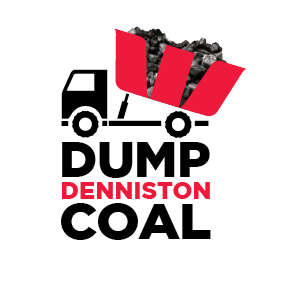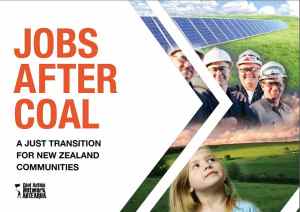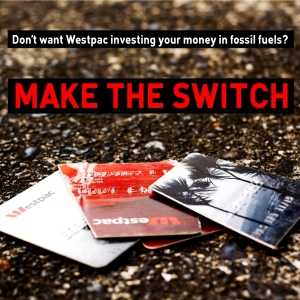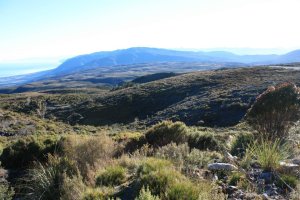What’s in this newsletter?
1. Upcoming Events
2. Heads in the Sand! Join us on December 7
3. The Elections – analysis from Jeanette Fitzsimons
4. The IPCC – and New Zealand’s response
5. Honey I shrunk the Board! Bathurst Resources AGM
6. Bathurst extracts its first coal from Denniston
7. Wood energy prospects exciting
8. The “Beyond Coal and Gas Conference,” Australia
9. Jobs After Coal report
10. From our Blog
11. seeing off climate deniers
12. A special message from the Flat Earth Society
13. Divestment: decisions building
14. Climate voter march – report from Christchurch
15 Want to get coal news from around the world?
1. Upcoming Events
November 29-30 Step it Up – tools for systematic change (Auckland)
December 6 Ahipara Stop Statoil Concert – and Ridesharing site from Auckland here
December 7 Heads in the Sand (National). See our Facebook event (and below for more info).
2. Heads in the Sand – Save the Date on December 7
Our Government, with its relentless focus on minerals extraction policies and addiction to dairy, has got its head in the sand on climate change. We’ve had enough of its weak, “let everyone else go first” attitude on climate, and its ongoing minerals extraction programme that threatens our beaches, our water, our coastlines and our Maui’s dolphins.
So we’ve decided to organise a Day of Action at beaches around the country on December 7, to send a message to the Government that we think it has its head in the sand on these issues.
The date coincides with the beginning of the second week of the international climate change talks in Lima, when our Ministers will be either there, or getting ready to leave.
We now have events set up in these places (links are to Facebook page events)
Dunedin: 1200 St Clair Beach
Christchurch 1200 New Brighton Pier
Nelson 11.30 Tahunanui Beach
Wellington 11.30 Oriental Bay
Auckland’s West Coast: Bethells Beach, 1000 am
Invercargill: meet on Oreti beach from 11.30 a.m. for a midday photo call, which will be followed by a family picnic. Organised by Coal Action Murihiku. Contact Jenny Campbell, 027 351 0180, jennycam@xtra.co.nz or Dave Kennedy 027 258 6686, vickbick.davek@xtra.co.nz
Ahipara: watch for news of the event on our facebook page.
Lima: a small team of kiwis will carry out this action on Lima’s Miraflores beach.
We’re looking for an Auckland person to be an on-the-ground contact for an event at Mission Bay, because lots activists will be up north in Ahipara. If you can help with this, please email coalactionnetwork@gmail.com
If you want to hold an event at your own beach, create a Facebook event and post it up on our main event page, and we’ll promote it for you. We’ve set up a Facebook page as an overall event page. Also please let us know – email coalactionnetwork@gmail.com
It’s a really easy event to do – on our page we have details of the “how to” (with health and safety guidelines, plus media guidelines) and we think it’ll send a strong message. This event was done in Australia as a message to Prime Minister Tony Abbott but, to be honest, our Government is no better. We’ll also have a media plan to go with it and instructions to support you.
Please help us promote this event in the next two weeks by sharing on Facebook and with your friends and, of course, taking part.
3. The elections
– Jeanette Fitzsimons
So: the election has come and gone and nothing has changed, except the perception that John Key has a renewed mandate to drill, mine and frack. It’s hard not to despair – so much more harm can be done in the next three years.
And of course he doesn’t really have that mandate. Surveys have shown that a substantial majority of kiwis want government to invest in clean energy rather than in extracting more fossil fuels.
But maybe it has to get worse to get better: to mobilise people to fight back. I’m just back from the Beyond Coal and Gas conference in Queensland where 270 committed activists strategised. They really have a nation-wide movement now, with more than 200 local “lock the gate” groups, a number of successful blockades and divestment campaigns, and traveling across the country to support each others’ actions.
That is not an accident; Australia is one giant fossil fuel mine, and people have reacted by becoming more active, more informed, more strategic and more co-operative. They have great communications and great financial analysis. We are going to need the same to protect Aotearoa from the new coal mines and deep sea oil fields that the Government and their corporate friends will be trying to foist on us over the next three years.
Where do you fit in? Will you join us at the next action? Heads in the Sand, we hope, will be the first of many actions over the coming year.
4. The IPCC – and New Zealand’s response
– Cindy Baxter
The Intergovernmental Panel on Climate Change has now released its final report – and it’s not great news. The global assessment of more than 30,000 studies concludes that climate change is here, we’re causing it. What’s more, we have to rid the global electricity system of fossil fuels by 2050 – and the world of fossil fuels by 2100 if we want to keep warming below 2degC. Carbon Brief has a good summary of what’s in the report.
The good news is that IPCC says it’s not going to cost a lot to do this, and renewable energy is on the up, especially in developing countries. There are so many resources on the IPCC it’s difficult to know where to start. This video is great. The Tree (produced by the Global Campaign for Climate Action) has a full set of resources.
The New Zealand Government “welcomed” the report, but Climate Change Minister went on to say that he didn’t want to hurt the bank accounts of big business by adopting “The Greens Agenda”. No, Minister, it’s not the Greens’ agenda, it’s a global one, led by UN Secretary General Ban ki-Moon. New Zealand’s contribution to the global debate so far has been to weaken our Emissions Trading Scheme, and suggest to the international community that the global agreement to be finalised in Paris next year should not include legally binding emissions reductions. I have blogged on this, and a Pentagon report saying that climate change is an immediate threat to global security, here at Hot Topic.
5. Honey I shrunk the Board!
A team of hardy “faux” shareholders turned out in Wellington on the morning of Bathurst’s AGM on Friday 14 November, armed with reports and faux board members, to hold the “alternative” AGM, one that talked about a real future. We called it our “Alternative Stakeholder Meeting”.
It was a peaceful affair, with the team managing to get into the legal offices where the meeting was held and get through about half our own stakeholder meeting agenda before one of the law firm’s partners got around to asking us to leave. By then, we’d managed to make a considerable impression on Bathurst shareholders arriving for their AGM.
We then ran through our entire stakeholder meeting on The Terrace . There are photos and press release on our blog here and more photos on 350.org’s Facebook page.
The blog’s headline refers to the fact that Bathurst is so strapped for money they had to fire two members of their own Board to save some cash.
6. Bathurst extracts its first coal from Denniston
-Jeanette Fitzsimons
Despite all our best efforts, we have to make the painful announcement that Bathurst is extracting its first coal from the Escarpment mine on the Denniston plateau.
For two and a half years we challenged them in the courts. From the first hearing in Westport, to Forest & Bird’s challenges in the Environment Court, the High Court and the Court of Appeal, to a parallel process where we assisted West Coast Environment Network arguing whether they should have to consider the impact of the coal on climate change, which ran in the Environment Court, the High Court and eventually in the Supreme Court.
During all this Rob Morris toured with his stunning photos of the wildlife on the plateau, and Forest & Bird held “bioblitzes” to discover new species in the mine area. Finally they needed a consent to operate from the minister of Conservation who despite his title decided this exceptional biodiversity didn’t matter.
But sometimes when you lose, you win. While all this was going on the international price of coking coal dropped from over $300/tonne to $107, making mining uneconomic for Bathurst.
They have dropped their production target from 500,000 MT/y rising to 2MT/y, to just 75,000 MT in the first year. They plan to use it in the local market and to send some overseas to potential customers to prove quality. We wonder how, at that price, they plan to pay the $40m they will owe to L&M, from whom they bought the mine, once they have extracted 25,000 tonnes.
No reputable analyst expects coal prices to rise in the next few years. They will make a smallish mess of the plateau, and we are sad and angry about that, but most of the coal will stay in the ground at present prices.
Further, the next 6-7 mines they plan on the plateau are unlikely to proceed.
7. Wood energy prospects exciting
– Jenny Campbell
The focus on using wood as an energy source was the theme at the launch of the Wood EnergySouth project in late October, with about 70 people from across Southland businesses, schools, forestry interests and local and central government intent on learning of the potential.
‘’The target from the project is to deliver 55 000 cubic metres of woodchips being delivered annually to industries such as the meat works as well as smaller businesses and schools,’’ technical support advisor, Venture Southland, Lloyd McGinty says. The scheme had incentives on offer as well as capital support for projects switching away from coal to wood.
Two highlights of the day were site visits to McCallum Group laundry at Otepuni Avenue, Invercargill with its recycled wood chip boiler and as a contrast, Slinkskins at Thornbury with their new, state of the art industrial heat plant.
Managing Director of McCallum Group, Wayne McCallum spoke to about 30 people at his plant, about their pioneering efforts in converting from LPG and oil. Buying a lignite boiler from a dairy factory and converting it to a wood chip boiler was a good investment, and had huge benefits in fuel savings, savings on boiler maintenance, health and safety benefits.
People were impressed with the cleanliness of the boiler room and their commitment to reducing their carbon footprint by a further 25%. Support from the Energy Efficiency Conservation Authority (EECA) had been invaluable with their support and advice and they are available on a continuing basis now through this Wood Energy South project, funded by the government.
Information for all the different applications for schools, industrial, commercial and service providers are on the website.
8. The “Beyond Coal and Gas Conference,” Australia
– Rosemary Penwarden
Fighter planes flew low in formation over our heads, adding to the unreality of the Beyond Coal and Gas conference near Brisbane recently; unreal because I had flown over fresh snow on the Maungatuas near Dunedin Airport to arrive in 39 degree heat in the Lucky Country, just as Australian Super Hornets had flown their 43rd sortie into Iraq as part of the US-led operation “Inherent Resolve”. The planes weren’t spying on us – there was an air force base nearby, but despite the heat it sent a chill down my spine.
There’s another war going on in Australia. On one side is a fossil fuel industry displaying all the signs of desperation as it scrapes and sucks coal and coal seam gas (CSG) from below the feet and livelihoods of Australians in a mad rush to meet shareholder expectations, endangering all in its path, including Australia’s most precious natural resource, its water.
On the other side are growing numbers of people from all walks of life, from farms and cities, young and old, black, brown and sunburned white, standing up and saying NO. Many hundreds of arrests, blockades, sit-ins, and all kinds of creative and peaceful direct action have followed community meetings. Australia’s biggest ever social movement is on the rise.
My favourite story from the weekend was of a farmer, at first defeated and depressed about the CSG invasion of his region, organising, blockading his land alongside neighbours, indigenous people and environmentalists, and finally donating 1,000 acres of it back to the local aboriginals, the nation’s ‘first owners’ (who say they do not ‘own’ Mother Earth – she owns them). Before the blockade changed his life, he had never spoken to an aboriginal person.
People power is giving the Australian government and fossil fuel industrial ‘war’ machine a run for its money and in places it’s winning.
For the amazing and inspiring story of the Bentley Blockade in the Northern Rivers, NSW: http://csgfreenorthernrivers.org/about-the-csg-free-campaign/
Front line action on coal to save the Laird State Forest.
Lock the Gate alliance
I felt privileged to meet so many committed, ‘ordinary’ people who understand the science and threat of climate change, who understand what needs to be done and are doing it. They are not defeated. They will win.
9. Jobs After Coal report
– Rosemary Penwarden
Jeanette and I took CANA’s Jobs After Coal report to Australia in the last week of October, to the Beyond Coal and Gas conference where we met up with around 270 campaigners against coal and coal seam gas. Our “Just Transitions” workshop attracted a big crowd and plenty of discussion.
We’re at different stages in the shift away from coal here in New Zealand, with half the coal mining workforce already gone in the past few years, but layoffs and mine closures are now increasing in Australia. Discussions are underway in the Aussie union movement and, as in New Zealand, the transition to renewables is happening despite a backward-looking, head-in-the-sand and hand-in-the-coal-industry’s-pocket government.
One of the really interesting movements taking root there is Earthworker Co-operative – a community-led initiative to provide sustainable, wealth-creating jobs that empower local communities and provide clean energy solutions.
10. On our blog
What you may have missed in our recent blogs:
Why would a Trans Pacific Partnership Agreement be bad for the climate? Tim Jones explains.
National’s Mining Agenda Has Failed by Tim Jones: After two terms of promoting mining, and bending over backwards to accommodate mining, and opening up conservation land and the seabed to mining, and removing legal impediments to mining – National has nothing to show for it.
11. Seeing off climate deniers
We were struck with horror on the morning on 4 November when TVNZ’s Breakfast show ran a full interview with the NZ Climate Science Coalition’s Bryan Leyland as part of its IPCC coverage.
They just let him talk his terrible nonsense about how the world wasn’t warming. A really good blog went up on Hot Topic about how wrong Leyland was, and many of us set about tweeting to TVNZ, commenting on their Facebook post and making formal complaints. We understand our climate scientists were also pretty upset.
By the afternoon, TVNZ had gotten the message, and took the whole story and video down off its website. They left their Facebook post up, which links to nowhere, but which has the deluge of outrage. Thanks to everyone who joined the fray – it was worth it. Let’s hope TVNZ is a little more careful when considering interviewing climate cranks like this in the future. Leyland is an engineer, and not a climate scientist, and to let him have such a clear run in the face of a global assessment of 30,000 studies was terrible.
We would like to see TVNZ taking a look at how it covers scientific issues, especially climate science, just as the BBC has. The BBC’s Trust has issued guidelines on science reporting. Its review says:
“The BBC has a duty to reflect the weight of scientific agreement but it should also reflect the existence of critical views appropriately. Audiences should be able to understand from the context and clarity of the BBC’s output what weight to give to critical voices…. Judging the weight of scientific agreement correctly will mean that the BBC avoids the ‘false balance’ between fact and opinion”
12. A special update from the Flat Earth Society.
There’s this outfit called the Flat Earth Society who want to be friends with those who claim global warming is a conspiracy. They sent us details of an outing they had in Dunedin on the occasion of a visit by Australian climate sceptic Bob Carter.
“On the 9th day of September in the Year of Our Lord 2014, on the occasion of the noble endeavour of His Eminence the Emeritus Bob Carter to strike down the Conspiracy of those Treacherous Scientists and Greens who have forced our government in the City of Wellington to pay homage to the dark Lords of NIWA, NASA and the veritable nest of vipers that is the IPCC, we, of the Dunedin Branch of the Flat Earth Society, had the great pleasure of welcoming Him and extending the hand of Friendship and Solidarity.
“We rejoice that we have found a like-minded soul battling such a global conspiracy, and rejoice that the esteemed and intelligent University of Otago Vice Chancellor saw fit to allow our Dear Bob to speak in our fair but misguided City. Our arm of Friendship and Solidarity extends to this Dear Lady.
“We await, with usual unlimited patience, a reply from His Eminence Bob Carter, to our humble request to share with us some of the bright fine gold that has come his way in support of his Great Mission from most venerable sources, such as the Heartland Institute and their friends ExxonMobil, Koch Brothers and Scaife Family Foundations.”
13. Divestment decisions building
New Zealand Institutions have been among the leaders of the pack on divestment from fossil fuels. First, we had the New Zealand and Pacific diocese of the Anglican Church pledged to get out of fossil fuels. It was followed soon after by the Dunedin City Council voting to endorse divestment. However Dunedin still has a final decision pending: please sign here to support Dunedin Councillors to do the right thing!).
Then this month the Victoria University Council made a similar decision. Every week there seem to be new institutions around the world joining the fray, including Stanford University and the Rockefeller Family Fund.
In Australia, there’s been a huge debate, especially after Australian National University made the pledge, and was greeted with howls of derision from the Prime Minister, the Treasurer and the Education Minister, no doubt spurred on by the mining industry mouthpiece, the Minerals Council. But the ANU has held its ground. The whole story can be found here on The Tree (these alerts are great for people wanting to keep up with climate developments) There will be many more to follow.
We’ve seen ourselves here in New Zealand that investment in the coal industry isn’t exactly returning large sums to its shareholders, including Solid Energy and Bathurst Resources, both of which could be described right now as stranded assets.
The wave is getting bigger and we’re very proud that our institutions are part of it. Special mention here for CANA’s own Jenny Campbell for her tireless work on the Anglican Church.
14. Climate Voter March – great turnout in Christchurch
– Rachel Eyre
A week before the election, and a week prior to the People’s Climate March that started in New York , we held our own spectacular March for Action on the Climate in Christchurch, organised by a diverse NGOs around the Climate Voter theme. Whilst we only had 300 people in contrast to New York’s 400,000 (!), the day was wet and cold and most people would be forgiven for sitting comfortably at home, resigned to the fate of a predetermined election result. However a wide range of people did turn out with their signs and their umbrellas. We had young and old, Councillors, politicians (you can guess the colours), professionals, including a group of midwives with their babes in arms, and ordinary folk.
These people were not all your typical hardcore environmentalists. For some it was the first time they’d participated in anything like a march but felt compelled to vent their concerns.
The aim of the march was to be as inclusive as possible and to portray climate change as more than an environmental issue, but a social, health and economic one too. The unifying message was “We want to see effective government action on climate change.”
The atmosphere was very positive and after marching down Riccarton Rd we gathered in Hagley Park for speeches, photos and the deflation of a giant-sized dinosaur representing “down with dinosaur thinking!”
Christchurch will also be one of the places aiming for a great turn out for the ‘Heads in the Sand’ event on 7 December at New Brighton Beach.
15. Want to read Coal news from around the world?
- We can heartily recommend subscribing to CoalWire, an international newsletter for people working on coal around the world. This weekly update gives news on everything from local activism in Australia, India and China (and elsewhere) to what’s going on in the world of coal commodities. Sign up here.
- There’s also an international website dedicated to #endcoal (that’s the hashtag from here on, twitterers). Endcoal.org hasn’t got any kiwi stuff on it yet, but it will.








